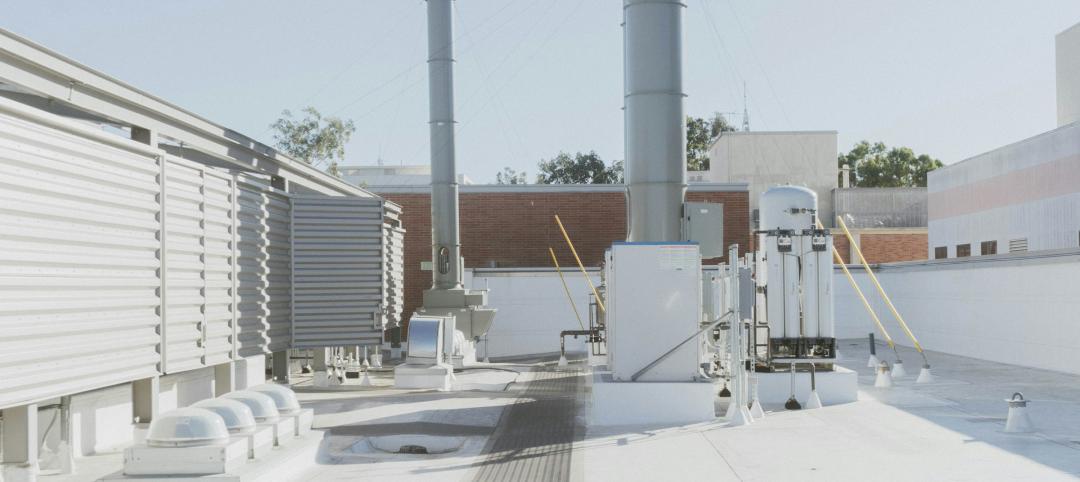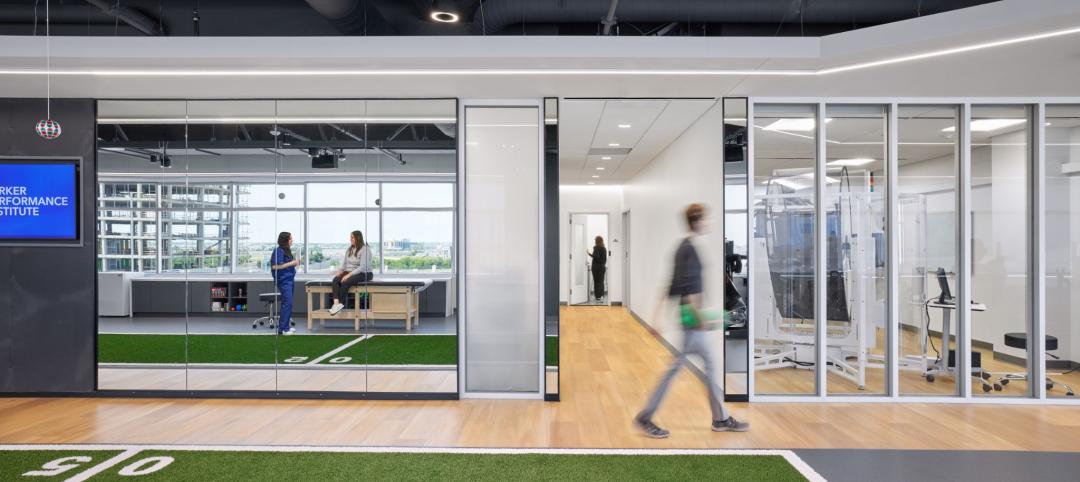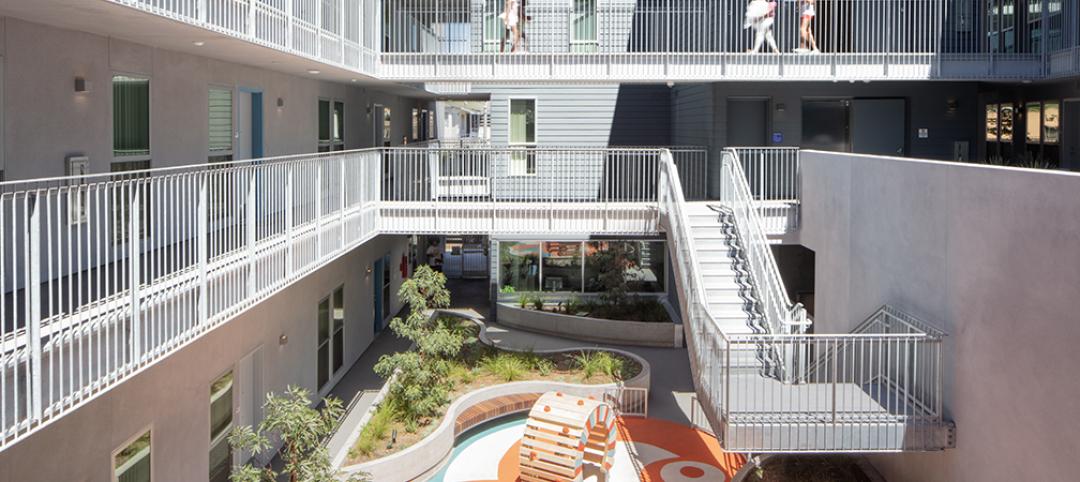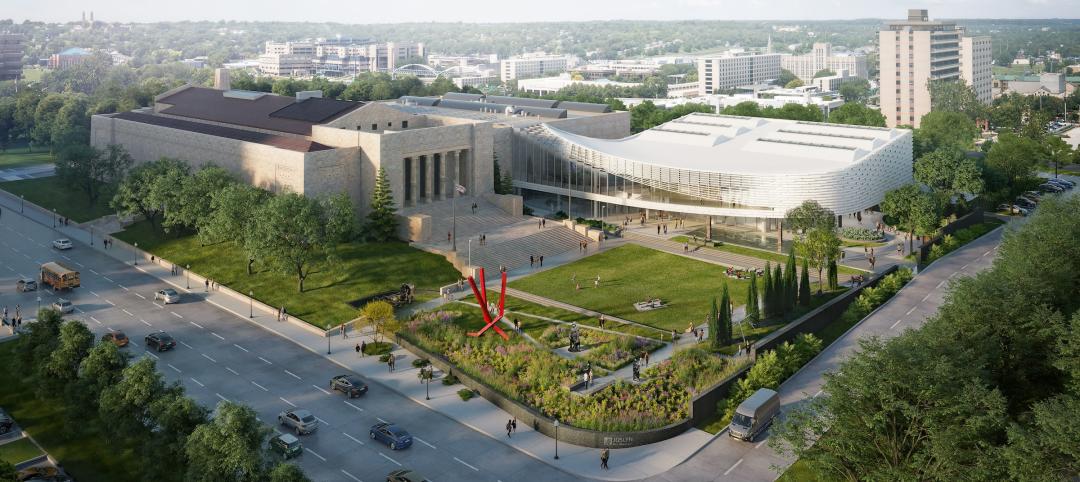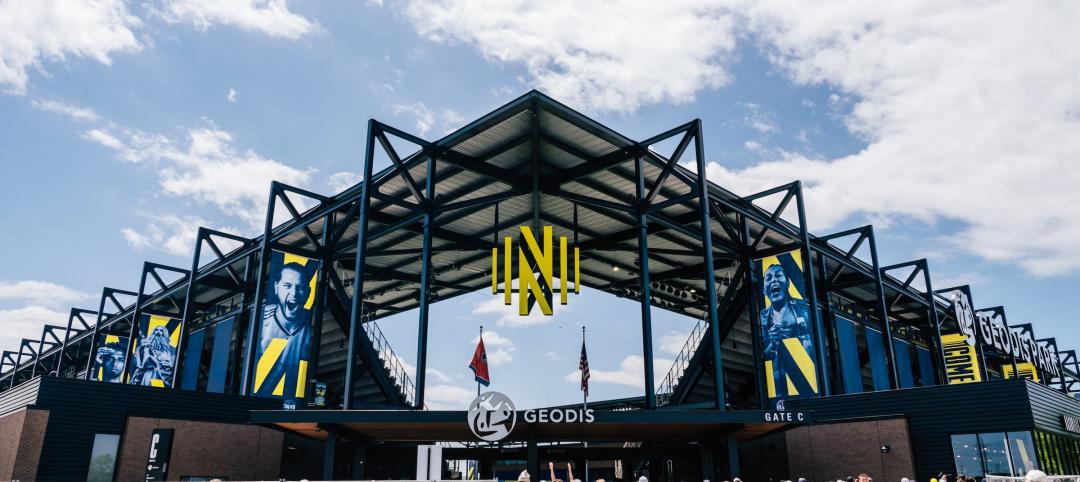Since 1950, the College World Series has been played in Omaha, Neb., the only NCAA event that has stayed in one location for over 60 years. Over the course of six decades, the community of Omaha has developed strong emotional ties to the College World Series as well as to its home field, Rosenblatt Stadium.
Originally built for minor league play in the 1940s, in recent years Rosenblatt Stadium had begun to shows its age, and patchwork renovations could not improve it enough to satisfy the demands of fans, the NCAA, and CWS broadcast partner ESPN.
As the contract for the College World Series came up for renewal, the city formed a committee to evaluate whether to try to reconstruct Rosenblatt Stadium or build new on one of eight potential new sites. Once it was determined to build new and a site was selected, the Building Team, led by local A/E firm HDR Architecture Inc., in collaboration with Populous, Kansas City, Mo., worked with the owner, the Metropolitan Entertainment and Convention Authority (MECA), to refine the ballpark’s final programming and design.
SPEEDING DOWN THE BASEPATHS
The new stadium had to be ready by April 2011 for the first pitch of the 2011 College World Series, which put the project on a 28-month construction schedule. To keep up the pace, members of the local GC/CM firm Kiewit Building Group moved into the HDR Omaha office. HDR and Populous collaborated on the design process, which involved meeting the needs of ESPN, the city of Omaha, MECA, and the College World Series of Omaha.
Project summary
SILVER AWARD
TD Ameritrade Park, Omaha, Neb.Building Team
Submitting firm: HDR Architecture Inc. (AOR, structural/ME engineer)
Owner/developer: Metropolitan Entertainment & Convention Authority
Architect of MEP coordination: DLR Group
Sports architect: Populous
Consulting structural engineer: Thornton Tomasetti
ME consulting engineer, plumbing engineer: M-E Engineers Inc.
GC/CM: Kiewit Building GroupGeneral Information
Size: 253,638 sf enclosed, 597,458 sf including concourse
Construction cost: $91 million
Construction period: January 2009 to April 2011
Delivery method: CM at risk
The structural program called for the stadium to be separated into two parts, the grandstand and the lower seating bowl/outfield area. This division allowed two teams to work on the structure simultaneously during the design development phase, which saved considerable time.
The Building Team incorporated a mechanically stabilized earth wall system to retain the lower seating bowl earth fill, in lieu of a system of structural concrete retaining walls and footing. This option alone saved the project over $500,000.
“The construction of this stadium was a feat to pull off so quickly and the coordination between infield and outfield was challenging,” said Building Team Award Judge Timothy Brown, AIA, studio associate professor and director of international affairs, Illinois Institute of Technology.
MEETING THE NEEDS OF NUMEROUS PLAYERS
Unique in capacity and character, TD Ameritrade Park was built as a hybrid to accommodate not only NCAA Division I requirements for baseball but also music festivals, football, and even ice hockey.
“The Trade,” as it has come to be known, opened to a sellout crowd on April 19, 2011 (Nebraska 2, Creighton 1). The 24,000-seat stadium has the cozy feel of a minor league park but is loaded with the amenities of a Major League Baseball stadium: 26 suites, four team clubhouses, administrative offices, 5,000 sf of retail space, and a continuous 360-degree concourse. Total building area is 597,458 sf, 253,638 sf of which is enclosed.
The Building Team for TD Ameritrade Park competed against a short schedule, on a difficult site, and under public pressure to ensure the College World Series would stay in Omaha. Perhaps the highest compliment of the new park came from two long-time College World Series ticketholders who told NCAA Vice President for Baseball and Football Dennis Poppe, “Mr. Poppe, we came up here just wanting to hate this park, but it’s pretty nice.” BD+C
--
Click here to view exclusive video interviews of the 2012 Building Team Awards judges explaining their selections.
Related Stories
Codes and Standards | Mar 15, 2024
Technical brief addresses the impact of construction-generated moisture on commercial roofing systems
A new technical brief from SPRI, the trade association representing the manufacturers of single-ply roofing systems and related component materials, addresses construction-generated moisture and its impact on commercial roofing systems.
Sports and Recreational Facilities | Mar 14, 2024
First-of-its-kind sports and rehabilitation clinic combines training gym and healing spa
Parker Performance Institute in Frisco, Texas, is billed as a first-of-its-kind sports and rehabilitation clinic where students, specialized clinicians, and chiropractic professionals apply neuroscience to physical rehabilitation.
Market Data | Mar 14, 2024
Download BD+C's March 2024 Market Intelligence Report
U.S. construction spending on buildings-related work rose 1.4% in January, but project teams continue to face headwinds related to inflation, interest rates, and supply chain issues, according to Building Design+Construction's March 2024 Market Intelligence Report (free PDF download).
Apartments | Mar 13, 2024
A landscaped canyon runs through this luxury apartment development in Denver
Set to open in April, One River North is a 16-story, 187-unit luxury apartment building with private, open-air terraces located in Denver’s RiNo arts district. Biophilic design plays a central role throughout the building, allowing residents to connect with nature and providing a distinctive living experience.
Sustainability | Mar 13, 2024
Trends to watch shaping the future of ESG
Gensler’s Climate Action & Sustainability Services Leaders Anthony Brower, Juliette Morgan, and Kirsten Ritchie discuss trends shaping the future of environmental, social, and governance (ESG).
Affordable Housing | Mar 12, 2024
An all-electric affordable housing project in Southern California offers 48 apartments plus community spaces
In Santa Monica, Calif., Brunson Terrace is an all-electric, 100% affordable housing project that’s over eight times more energy efficient than similar buildings, according to architect Brooks + Scarpa. Located across the street from Santa Monica College, the net zero building has been certified LEED Platinum.
Museums | Mar 11, 2024
Nebraska’s Joslyn Art Museum to reopen this summer with new Snøhetta-designed pavilion
In Omaha, Neb., the Joslyn Art Museum, which displays art from ancient times to the present, has announced it will reopen on September 10, following the completion of its new 42,000-sf Rhonda & Howard Hawks Pavilion. Designed in collaboration with Snøhetta and Alley Poyner Macchietto Architecture, the Hawks Pavilion is part of a museum overhaul that will expand the gallery space by more than 40%.
Affordable Housing | Mar 11, 2024
Los Angeles’s streamlined approval policies leading to boom in affordable housing plans
Since December 2022, Los Angeles’s planning department has received plans for more than 13,770 affordable units. The number of units put in the approval pipeline in roughly one year is just below the total number of affordable units approved in Los Angeles in 2020, 2021, and 2022 combined.
BIM and Information Technology | Mar 11, 2024
BIM at LOD400: Why Level of Development 400 matters for design and virtual construction
As construction projects grow more complex, producing a building information model at Level of Development 400 (LOD400) can accelerate schedules, increase savings, and reduce risk, writes Stephen E. Blumenbaum, PE, SE, Walter P Moore's Director of Construction Engineering.
AEC Tech | Mar 9, 2024
9 steps for implementing digital transformation in your AEC business
Regardless of a businesses size and type, digital solutions like workflow automation software, AI-based analytics, and integrations can significantly enhance efficiency, productivity, and competitiveness.



